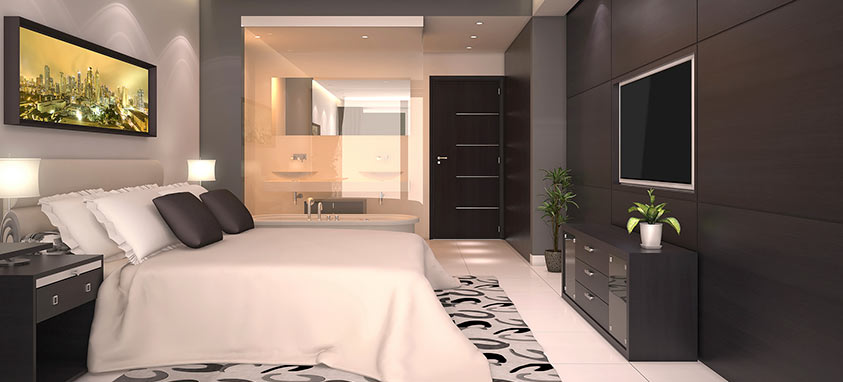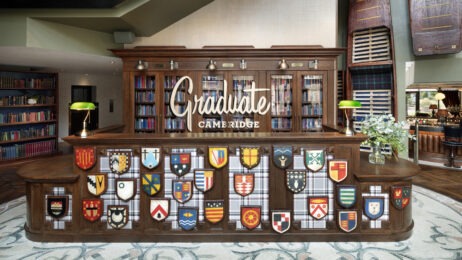In an effort to remain profitable in the competitive hospitality industry, a growing number of hotels are eliminating guest room staples such as bibles and bed scarves, and cutting back on labor-intensive offerings such as artistically-folded towels and toilet tissue.
In a series of blog postings on hotelmanagement.net, editor Glenn Haussman details 15 items that hotels could eliminate—and save money in the process.
1. Bed scarves. This old-fashioned and basically useless design element is usually the first thing guests fling off the bed when they arrive. They do nothing to enhance the guest stay experience, cost hoteliers money to launder, and annoy housekeepers who repeatedly have to pick them up from the floor.
2. Decorative pillows. These are usually the second things to get the boot in a guest room. Guests who want pillows will use the ones on the bed. Decorative pillows, which can attract dust and mites, are superfluous, and they are not routinely washed after each guest visit.
3. Bibles. The bibles found in hotel rooms are Gideon bibles, named after a group of male missionaries and Christian businessmen who hand them out for free. Since 1908, more than 1.8 billion of them have been distributed in hotels around the world. Lately they have become controversial, as non-Christian guests view them as offensive. One solution is to stash an assortment of spiritual texts in the nightstand drawer; the other option is to remove them from guest rooms but have several copies available at the front desk for those who request it.
4. Daily maid service. Many hotel guests do not want to be bothered, especially if they are just staying for a night or two. The same goes for elaborate turndown service. Those who don’t want little chocolates left on their pillow view turndown service as an unnecessary intrusion rather than a valued amenity.
5. Fancy breakfast bars. Hotels that offer complimentary breakfast always seem to be tinkering with the formula. Experts advise keeping it simple. Instead of dozens of options that make set up/break down more complicated and contribute to unnecessary food waste, just provide the basics, focusing on freshness.
6. Business centers. These have gone the way of the dinosaur now that travelers have smartphones, tablets and laptop computers, and can work from their rooms or the hotel lobby. To accommodate those who occasionally need to print out a document, a hotel might want to install a Bluetooth-enabled printer at the front desk.
7. In-room marketing material. Hotels routinely place brochures about their loyalty program, local attractions or the nearby restaurant in guest rooms in hopes that people will read them. Unfortunately, most of the time the fliers just create clutter or end up in the recycling bin.
8. Glassware. While a water glass in the bathroom may seem more elegant than a disposable paper or plastic cup, many people question its cleanliness. Several years ago videos surfaced portraying housekeepers polishing glasses with the same cloths they used to wipe down sinks and toilets. As a result, trust in hotel glassware went down the toilet.
9. Heavily scented bathroom amenities. Hotels often invest time and money selecting bathroom amenities, not realizing that many guests have sensitivities that are aggravated by scents. If the hotel’s signature scent is strong, be sure to have unscented alternatives available.
10. Folded towels and toilet tissue. Although some guests do find them delightful, housekeepers can waste considerable time folding towels into heart shapes or adorable animals, and elaborately folding the first piece of toilet paper on the roll to look attractive.
11. Bathroom phones. These used to be considered the ultimate in luxury, but today everyone has a mobile device so they have become unnecessary. And who wants to use a phone that someone else may have used while perched on the potty anyway?
12. Fresh sheets daily. Many hotels concerned with water conservation have become proactive about asking guests if they really need their linens changed daily. Most eco-friendly guests are happy to oblige with less frequent linen changes, especially if they earn extra reward points for doing so.
13. Paper toilet sashes. Placing a paper sash around the toilet seat that reads, “Sanitized for your protection” is an unnecessary waste of paper. Guests expect the entire bathroom to be clean and sanitized; there is no need to draw attention to it.
14. Traditional desks and dressers. Furniture occupies a lot of space in a guest room and many travelers, especially millennials, eschew it. Instead of desks, they will use laptop trays or coffee tables. Instead of dressers, they prefer hanging their clothes on wall hooks or placing it on wire shelving.
15. Front desks. In many hotels the traditional front desk is disappearing; replaced by small kiosks or hospitality stands. This is part of a nationwide trend of more open and flexible lobby design created to make guests feel as though they are entering a home rather than a hotel.




